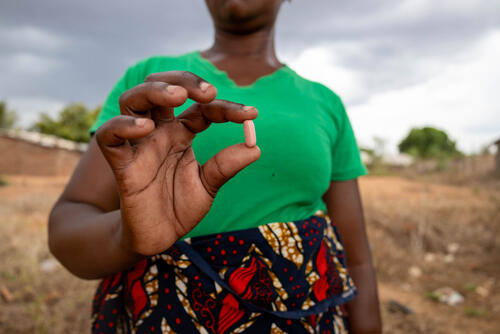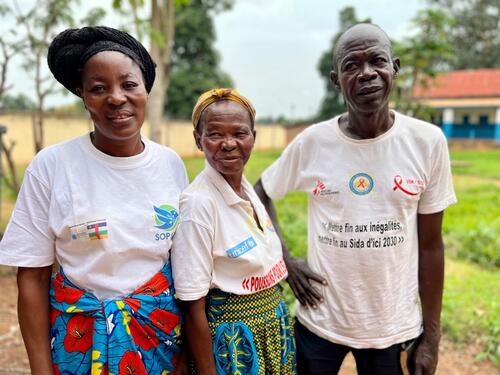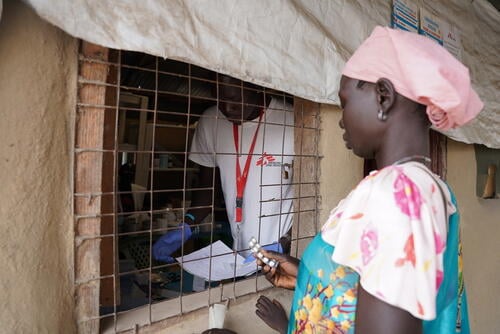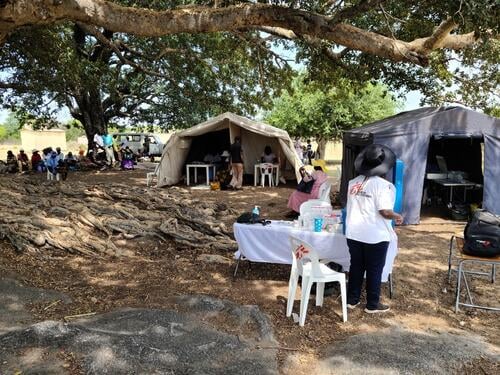The 25th International AIDS Conference is in Munich, Germany, from 22 to 26 July.
MSF expresses our concerns on key issues that we see in the HIV response today.
- CD4 testing is an essential gateway into lifesaving care as it is the only way to identify people with advanced HIV disease (AHD). Without widely available CD4 testing, progress towards the 2030 goals for reduced mortality from AIDS will be threatened. It needs to be scaled-up, available and fully funded. The current CD4 crisis due to companies supplying CD4 tests withdrawing from this market needs mobilization from all stakeholders to define a comprehensive roadmap and concerted action to support the development, production, introduction, and scale-up of new effective CD4 technologies, including point-of-care tools, and a 3-5 year action plan to ensure a ‘bridge’ that will ensure access to existing tools. (Link to the Nairobi declaration)
- Access barriers still remain for HIV prevention drug, CAB-LA, with global supply remaining inequitably distributed and concentrated in high-income countries, fair and transparent pricing for middle-income countries still unannounced, and slow progress towards generic manufacturing.
- With lenacapavir, a subcutaneous injection delivered every six months, likely soon to be approved for the prevention of HIV, MSF does not want to see any repetition of the access barriers that thwarted access to CAB-LA in low- and middle-income countries (LMICs), and will continue to advocate for Gilead to voluntarily license lenacapavir to ensure that people in LMICs can access this long-acting HIV prevention drug without unnecessary delays.
- Prices of commodities are also a major barrier to access. The GeneXpert HIV tests supplied by Cepheid to LMIC, and currently priced at US$14.90 per test, have to drop to $5 each, for HIV and for all other diseases, so that millions more people around the world can be properly diagnosed and receive the treatment they need to stay alive and healthy.MSF Acces Campaign petition for Time for $5. Help us stop the profiteering on medical tests (msf.org.au)
- CD4 crisis is not the only threat for the implementation of AHD care package. Funding issues in most LMICs are leading to impossible choices with the basic advanced HIV disease package, including CD4 testing followed by TB and cryptococcus testing and treatment, being not prioritised, deprioritised or not implemented at a large scale. Commitment and investment are needed not just for the basic package, but also for the extended package of AHD care, including severe bacterial infections, histoplasmosis and other opportunistic infections such as Kaposi sarcoma.
- Innovation and implementation of new tools are also key components that will contribute to achieving the global targets by 2030.New rapid tests to diagnose TB and histoplasmosis in PLHIV are arriving on the market, bringing hope for easy testing for opportunistic infections.
- Sustainability conversations and plans cannot be implemented at the expense of innovations and testing of creative solutions that still need to be developed and implemented to have a chance to achieve the global targets. To this extent, attention must be brought to criminalized populations and blind spots in the response, such as humanitarian contexts.
- Considering the shrinking of civic space in many countries, civil society organizations (CSOs) and communities are at risk of facing additional barriers in the fight against HIV in the close future. Having international donors that can directly support CSOs and communities that remove barriers for criminalised people to access care is vital.

Advanced HIV disease care under threat
Despite substantial progress in antiretroviral therapy (ART) scale up, an estimated 30% of people living with HIV (PLHIV) continue to present with advanced HIV disease, contributing to ongoing HIV-related morbidity and mortality.PubMed. Distribution of advanced HIV disease from three high HIV prevalence settings in Sub-Saharan Africa: a secondary analysis data from three population-based cross-sectional surveys in Eshowe (South Africa), Ndhiwa (Kenya) and Chiradzulu (Malawi).
WHO recommends that all adults entering or re-entering care receive a CD4 test to identify AHD. But the removal of two WHO prequalified point-of-care CD4 machines for CD4 countingPima machines from Abbott and FacsPresto machines from BD. from the market has plunged national HIV programmes into a deep crisis. Without widely available CD4 testing, access to the lifesaving package of care to prevent and treat AHD is limited and will hold national programmes back from achieving reductions in death needed to meet the global targets. CD4 testing needs to be scaled-up, available and fully funded.
Obscene profits and funding gaps
The CD4 crisis is not the only threat in the global response to HIV. Prices of other commodities are also threatening broad access and effective response. One major example is the medical test maker Cepheid, which is owned by US corporation Danaher, who vastly overcharges LMICs for the GeneXpert tests used for HIV early infant diagnosis and HIV treatment monitoring in specific populations (e.g. pregnant women, children and adolescents) for whom rapid turnaround times to get results is important. A study by Médecins Sans Frontières (MSF) shows that Cepheid and Danaher could be charging $5 for each of these medical tests and still make a profit, but instead, the company charge LMICs $14.90 per HIV test for more than a decade now, even in the world’s poorest countries.
The exorbitant profits from pharma companies on lifesaving medical tools are situated in a broader context of generalized funding gaps that are largely responsible for the low uptake of basic AHD package in most LMICs. Countries must make impossible choices between equally important components of the response, leading to AHD care being not prioritized, deprioritised or not implemented at a large scale. Commitment and investments from donors and countries are definitely needed to accelerate the implementation of an extended AHD package that should include TB, cryptococcal meningitis, histoplasmosis, severe bacterial infections and other opportunistic infections such as Kaposi sarcoma.
The shrinking space for innovations in the sustainability era
New tools are coming to the market, such as the rapid test for histoplasmosis, bringing hope for easy screening of this disease. But to what extent will they be implemented considering the funding gaps and the CD4 crisis? Other innovations are waiting to be made broadly available and affordable in LMICs, such as long-acting HIV prevention drugs (CAB-LA & lenacapacir).
Since January 2022, MSF has been in negotiations with ViiV Healthcare to procure the critical HIV prevention drug long-acting cabotegravir (CAB-LA), for use in MSF’s HIV programmes in Mozambique, Malawi, Zimbabwe and Eswatini. Over the past two years, ViiV has repeatedly introduced new hurdles for MSF to jump through in order to access and purchase CAB-LA. Finally, CAB-LA is on its way to MSF HIV programmes from mid-2024, but global supply remains inequitably distributed and concentrated in high-income countries, fair and transparent pricing for middle-income countries still unannounced, and slow progress towards generic manufacturing.
With lenacapavir, a subcutaneous injection delivered every six months, likely soon to be approved for the prevention of HIV, MSF does not want to see any repetition of the access barriers that thwarted access to CAB-LA in LMICs, and will continue to advocate for Gilead to voluntarily license lenacapavir to ensure that people in LMICs can access this long-acting HIV prevention drug without unnecessary delays. This follows on from a recent MSF letter to Gilead and a public letter MSF signed on to (here).
But ambitions for acceleration, innovation and implementation of new tools, already suffering from lack of funding, might further be cut off in the sustainability conversations. How much will governments and actors in charge of sustaining the gains be open to new interventions?
Knowing the shrinking of civic space in many countries, to what extent will CSOs and communities still be able to try to reach criminalised populations to give them access to care? How will those CSOs function without international support, when it is already clear that donors should focus more on how to ensure safety for CSOs when they are operating against the laws?
Lastly, we will not succeed in ending HIV as a global public health threat by 2030 if there is no effort to cover blind spots and complex environments where disruptions of HIV care happen daily. International donors and actors, together with governments and CSOs, need to work closely together to develop the mindset and the strategies that will minimize the disruption in case of emergency.
MSF speakers and presentations
MSF will organise and participate in several events and sessions in order to bring attention to these topics during the International AIDS Conference.
MSF speakers in sessions
|
Session |
Venue |
Date |
Time |
Speaker/panelist |
|
DSD for HIV and beyond – where we are and where we’re going |
Hall B0a |
20/07 |
15h-16h30 |
Helen Bygrave Georges Wambugu |
|
Mission possible?! How to ensure access to HIV & TB treatments and diagnostics |
EECA networking zone, Global village |
22/07 |
14h-15h15 |
Amanda Banda |
|
Reaching the 4th “90” target: Accelerating the integration of HIV and noncommunicable disease responses to improve quality of life for people living with HIV and affected |
Room 1 channel 2 |
22/07 |
15h-16h30 |
Helen Bygrave |
|
Key Populations Access to Cabotegravir (CAB-LA): Community Perspectives of Gaps, Successes and Lessons Learnt- What Issues Remain Especially in High Burden Low-Income Settings |
PLHIV Networking zone |
23/07 |
12h-12h50 |
Helen Bygrave Amanda Banda |
|
Health of displaced people in wartime: Who is responsible? |
Hall B0b channel 5 |
23/07 |
15h-16h |
Esther Casas |
|
Access challenges in HIV/TB diagnostics |
German pavilion |
24/07 |
15h30-16h |
Helen Bygrave |
|
Resilience in time of polycrises: How HIV programmes are adapting to climate, humanitarian, political and social crises |
Room 5, Channel 8 |
24/07 |
18h-19h30 |
Stéphanie Dreze Esther Casas |
| Title | Number, track | Venue | Author |
| Xpert MTB/RIF Ultra assay in stools and urine for the diagnosis of tuberculosis in children living with HIV: the Médecins Sans Frontières experience in Guinea-Bissau and South Sudan | TUPEB052, Track B2 | Poster exhibition | Laura Moreto |






